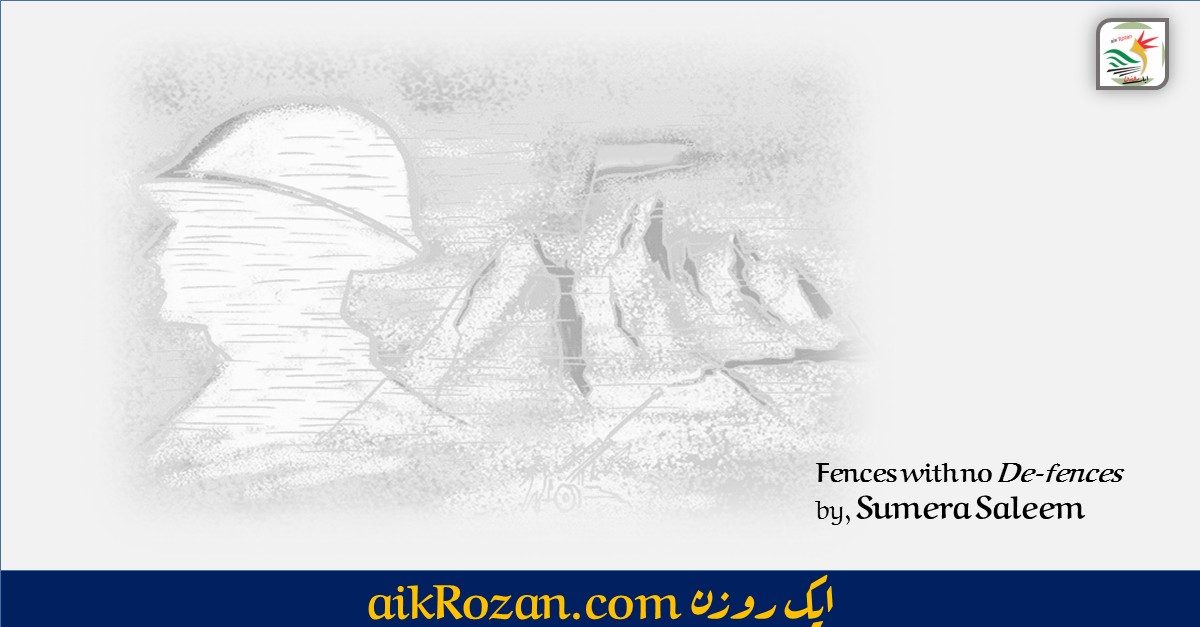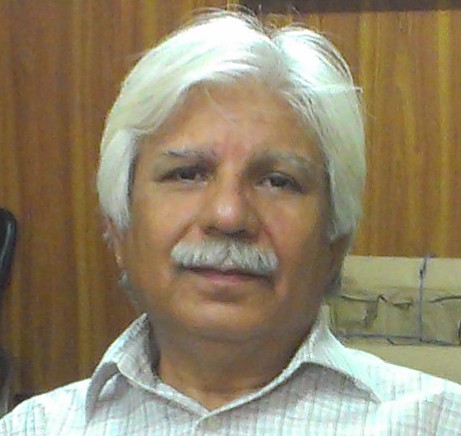
Fences with no De-fences
by, Sumera Saleem
What is called the Defence Day of Pakistan commemorates the 1965 war, or second Kashmir war. It celebrates the defence and protection of the country, which was ensured through the sacrifices and strength of the armed forces and the people of the country.
Does this day help us revise the way we understand defence? The idea of defence which is baked into the military creed is usually understood as protecting borders at the expense of massive sacrifices of life and resources. People barely scratch exterior surface of what is meant by defence, but anyone interested in understanding it needs to go deep into the layers of meanings which reach out to defence as a mechanism by which fundamental human rights are secured.
De-fence, I argue, means the establishment of a justice system which eventually leads to the strength of the economy and security, clearing away the fences of oppression. It stands not as the act of an institution, but rather a way of life which facilitates and protects the individuals from any fence of injustice which threatens their basic rights.
Justice demands an equal dispensation of law among the members of a society, giving no regard to any sort of discrimination which tilts the balance of basic human rights. It always works on the basis of laws which if used for the powerful and applied only to the poor, make the body of justice a sham. This happens only when there exists a loophole in the justice system.
Defending the people involved in custodial torture, a notorious norm in the Punjab Police department, challenges the mechanism of working of civil forces which generally acts as an instrument of causing sense of insecurity among the masses, serving mostly the chosen few with the maintenance of security.
This type of torture, which has created an intense wave of concern among the people, questions basic purpose of establishing such security (law and order maintaining) institutions which instead of ensuring peace are themselves involved in wreaking violence.
Laws without implementation will be vacuity and if removing the fence of law around the one, the responsible and accountable for a crime, in a society is called de-fence, the country will be a corporate jungle more suitable for the cleverest than the least clever.
It is imperative to defend the innocent because it preserves, Simon Waxman argues, the liberty of people wrongly charged. But defending the guilty preserves the legitimacy of the adversary system of justice itself. The decision of scaling right and wrong rests on the mainstay of the justice system, therefore, the individuals who cross the fences of law to reach such decisions and then defend their actions in the name of process of the institutions to which they belong should be served strict punishment to protect basic human rights.
During accountability process, defense of political shenanigans, especially by being tough-on corruption of the politicians, which have led to slashing economy of the country can be considered corrosive as they are designed to favour a person’s individualistic image at the expense of collective national interest. Therefore, verbose defence of the parties against corruption cases in press conferences gains the representatives nothing except public distrust as the people are left wondering at the soundness of their arguments which win them applaud on TV or social media, but not relief from the court.
Their cathartic outburst leads to the assumption, either court decisions or the pieces of evidence which the accused have, are not credible.
A recent debate on final decision over Amendment Ordinance on the GIDC (Gas Infrastructure Development Cess), vacillating between the President, the Prime Minister and now the court has proved that the state itself in a state of confusion with the confusion about the choices and having no mechanism to pre-assess the consequences, no system in the world can take a proper course of action. Preparing such a plan with a vision on the stability of the country and then defending its position to implement it, is surely deemed a reasonable way of governance. However, the way PTI’s government is ramping up caseloads on the courts will add more strength to the observation, already surfacing in the international media, about the failure of PTI’s government in managing financial crisis and governance.
Consolidating of occupied Kashmir in the Indian unconstitutional stranglehold on the part of India while subjecting Kashmiris to curfew and communication blackout has been serving injustice and violence in the region. This long winded issue testifies to Radcliffe Award as a dis-reward of harmony between India and Pakistan. This dis-reward made sure that both sides will keep on mending walls of differences proving that such fences are good enough to make bad neighbors while warding off any peaceful resolution of territorial fences.
Through gunboat diplomacy both Pakistan and India can never reach any political settlement over Kashmir thereby hammering one of the biggest humanitarian crisis in South Asia at ‘not tried-trial’. Resolution of the crisis does not need any explanation, reasons through which a state may defend its position and decisions. Rather it requires thinking, planning and implementing policies which ensure basic human rights of the people. Getting Kashmir just on public soapbox and not washing away lack of political credibility among the masses as well as foreign countries, which surged staggering economy into prominence, will sweep off the validity of working for national vision of freedom and security to integrate Indian controlled Kashmir into the body-politic of Pakistan.
Defence spans every attempt of guarding interest not of a sector, group or party, but of a collective community without any regard to colour, language, sect or religion. It is about removing fences of injustice which threaten the security inside the boundaries of the country.
Every year the celebration of this day invites us to rethink defence which is not limited to just protecting borders or fences. It also includes ensuring the ways which help to strengthen the justice system, removing any political, racial and religious divides. If defending border, with weapons and arms is what people understand as defence while taking no responsibility upon themselves for the welfare of the land they belong to, this type of defence is just a temporary though the least useful solution to guard the country through the military forces which, under the circumstances of war, have to absorb alone the pressure of maintaining security.
Sumera Saleem is a lecturer in English literature at the University of Sargodha (Main Campus), Sargodha.




